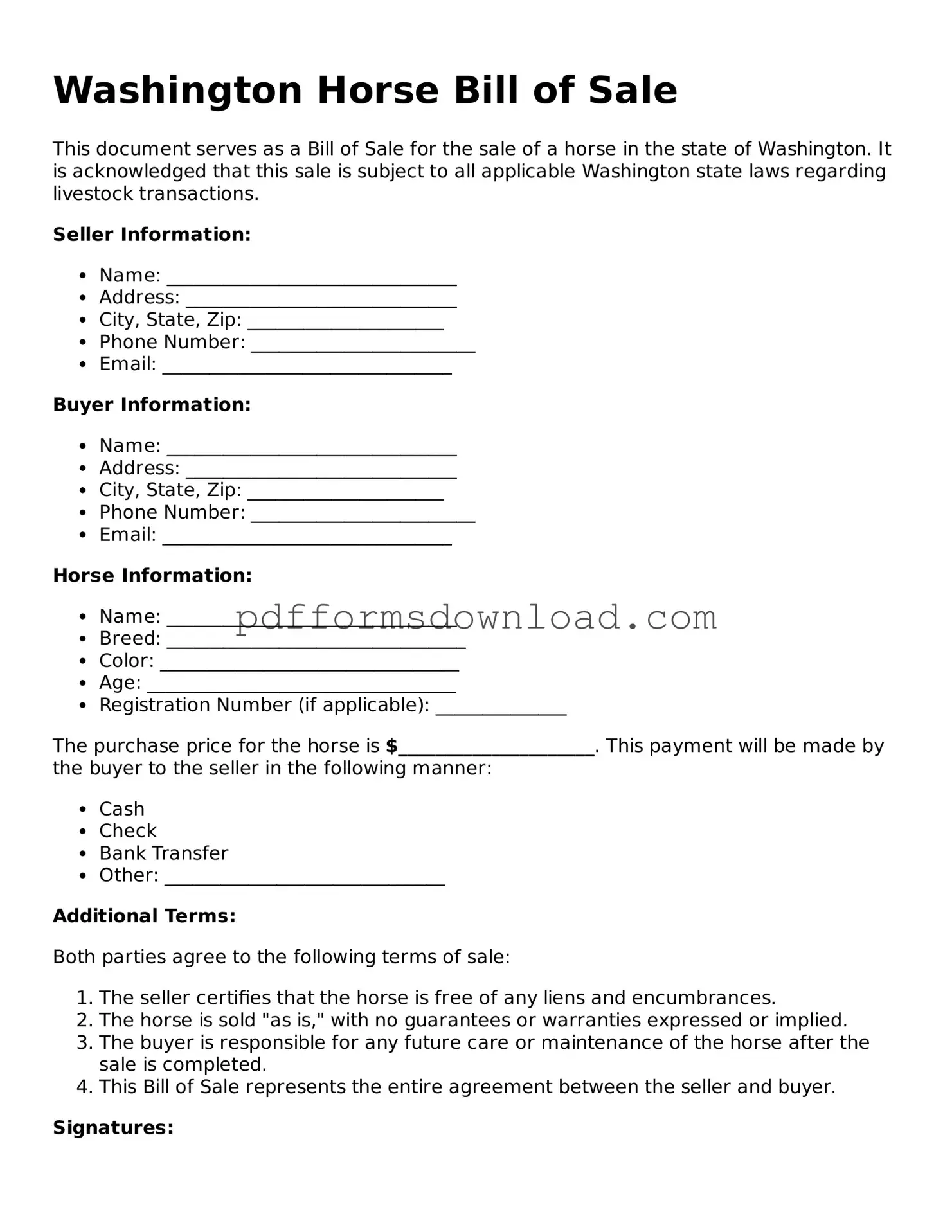What is a Washington Horse Bill of Sale?
A Washington Horse Bill of Sale is a legal document that records the sale of a horse in the state of Washington. It serves as proof of ownership transfer from the seller to the buyer. This document includes essential details such as the horse's description, the sale price, and the names and addresses of both parties involved in the transaction.
Why is a Bill of Sale important?
The Bill of Sale is crucial for several reasons. Firstly, it provides legal protection for both the buyer and the seller. For the buyer, it confirms ownership and can be used to prove possession in case of disputes. For the seller, it offers evidence that they no longer own the horse, which can be important for liability purposes. Additionally, it may be required for registration with breed associations or for insurance purposes.
What information should be included in the Bill of Sale?
A comprehensive Bill of Sale should include the following information: the full names and addresses of both the buyer and seller, a detailed description of the horse (including breed, age, color, and any identifying marks), the sale price, the date of the sale, and any warranties or guarantees provided by the seller. Both parties should sign the document to validate the transaction.
Do I need to have the Bill of Sale notarized?
While notarization is not a strict requirement for a Bill of Sale in Washington, it is highly recommended. Having the document notarized adds an extra layer of authenticity and can help prevent disputes regarding the legitimacy of the signatures. It can also be beneficial if you ever need to present the document in court.
Can I use a generic Bill of Sale form for my horse sale?
Yes, you can use a generic Bill of Sale form, but it is advisable to use a form specifically designed for horse sales. A specialized form will typically include all the necessary details relevant to equine transactions, reducing the risk of missing critical information. Ensure that any form you use complies with Washington state laws.
What if the horse has health issues or is sold "as-is"?
If the horse has known health issues or if the seller wishes to sell the horse "as-is," this should be explicitly stated in the Bill of Sale. Clearly outlining any conditions or limitations protects both parties. The buyer should be aware of any potential issues before completing the purchase, and the seller should not be held liable for undisclosed problems if they have been clearly communicated.
How do I handle payment when selling a horse?
Payment methods can vary. Common options include cash, certified checks, or bank transfers. It is essential to agree on a payment method before finalizing the sale. Ensure that payment is received and verified before transferring the Bill of Sale and the horse. This helps to avoid potential disputes regarding payment.
What should I do if the buyer does not pay?
If a buyer fails to pay after the sale has been agreed upon, it is essential to review the terms outlined in the Bill of Sale. If payment was not completed, the seller retains ownership of the horse and can take necessary steps to recover the horse or seek legal recourse. Consulting with an attorney may be beneficial in such situations to understand the best course of action.
Is a Bill of Sale required for all horse sales in Washington?
While a Bill of Sale is not legally mandated for all horse sales in Washington, it is highly advisable to have one. It protects both the buyer and seller by providing a clear record of the transaction. Without it, proving ownership or addressing disputes can become complicated. Therefore, having a Bill of Sale is a prudent step in any horse sale.

